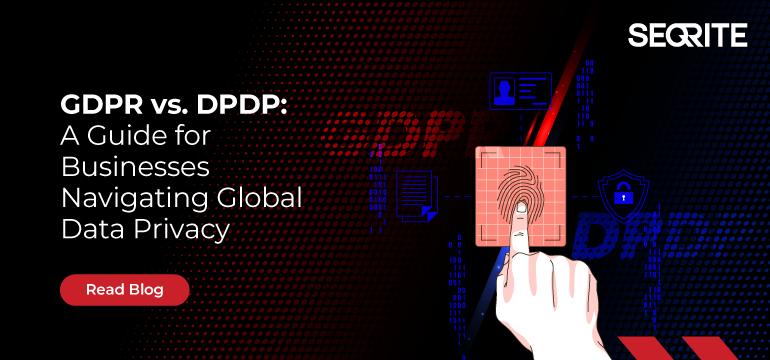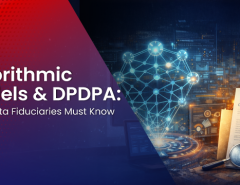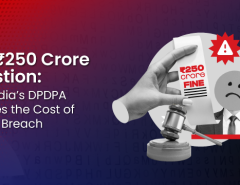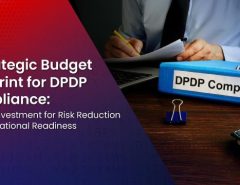Organizations manage personal data across multiple jurisdictions in today’s interconnected digital economy, requiring a clear understanding of global data protection frameworks. The European Union’s General Data Protection Regulation (GDPR) and India’s Digital Personal Data Protection Act (DPDP) 2023 are two key regulations shaping the data privacy landscape. This guide provides a comparative analysis of these regulations, outlining key distinctions for businesses operating across both regions.
Understanding the GDPR: Key Considerations for Businesses
The GDPR, enforced in May 2018, is a comprehensive data protection law that applies to any organization processing personal data of EU residents, regardless of location.
- Territorial Scope: GDPR applies to organizations with an establishment in the EU or those that offer goods or services to, or monitor the behavior of, EU residents, requiring many global enterprises to comply.
- Definition of Personal Data: The GDPR defines personal data as any information related to an identifiable individual. It further classifies sensitive personal data and imposes stricter processing requirements.
- Principles of Processing: Compliance requires adherence to lawfulness, fairness, transparency, purpose limitation, data minimization, accuracy, storage limitation, integrity, confidentiality, and accountability in data processing activities.
- Lawful Basis for Processing: Businesses must establish a lawful basis for processing, such as consent, contract, legal obligation, vital interests, public task, or legitimate interest.
- Data Subject Rights: GDPR grants individuals rights, including access, rectification, erasure, restriction, data portability, and objection to processing, necessitating dedicated mechanisms to address these requests.
- Obligations of Controllers and Processors: GDPR imposes direct responsibilities on data controllers and processors, requiring them to implement security measures, maintain processing records, and adhere to breach notification protocols.
Understanding the DPDP Act 2023: Implications for Businesses in India
The DPDP Act 2023, enacted in August 2023, establishes a legal framework for the processing of digital personal data in India.
- Territorial Scope: The Act applies to digital personal data processing in India and processing outside India if it involves offering goods or services to Indian data principals.
- Definition of Personal Data: Personal data refers to any data that identifies an individual, specifically in digital form. Unlike GDPR, the Act does not differentiate between general and sensitive personal data (though future classifications may emerge).
- Principles of Data Processing: The Act mandates lawful and transparent processing, purpose limitation, data minimization, accuracy, storage limitation, security safeguards, and accountability.
- Lawful Basis for Processing: The primary basis for processing is explicit, informed, unconditional, and unambiguous consent, with certain legitimate exceptions.
- Rights of Data Principals: Individuals can access, correct, and erase their data, seek grievance redressal, and nominate another person to exercise their rights if they become incapacitated.
- Obligations of Data Fiduciaries and Processors: The Act imposes direct responsibilities on Data Fiduciaries (equivalent to GDPR controllers) to obtain consent, ensure data accuracy, implement safeguards, and report breaches. Data Processors (like GDPR processors) operate under contractual obligations set by Data Fiduciaries.
GDPR vs. DPDP: Key Differences for Businesses
| Feature | GDPR | DPDP Act 2023 | Business Implications |
| Data Scope | Covers both digital and non-digital personal data within a filing system. | Applies primarily to digital personal data. | Businesses need to assess their data inventory and processing activities, particularly for non-digital data handled in India. |
| Sensitive Data | Explicitly defines and provides stricter rules for processing sensitive personal data. | Applies a uniform standard to all digital personal data currently. | Organizations should be mindful of potential future classifications of sensitive data under DPDP. |
| Lawful Basis | Offers multiple lawful bases for processing, including legitimate interests and contractual necessity. | Primarily consent-based, with limited exceptions for legitimate uses. | Businesses need to prioritize obtaining explicit consent for data processing in India and carefully evaluate the scope of legitimate use exceptions. |
| Individual Rights | Provides a broader range of rights, including data portability and the right to object to profiling. | Focuses on core rights like access, correction, and erasure. | Compliance programs should address the specific set of rights granted under the DPDP Act. |
| Data Transfer | Strict mechanisms for international data transfers, requiring adequacy decisions or safeguards. | Permits cross-border transfers except to countries specifically restricted by the Indian government. | Businesses need to monitor the list of restricted countries for data transfers from India. |
| Breach Notification | Requires notification to the supervisory authority if the breach is likely to result in a high risk to individuals. | Mandates notification to both the Data Protection Board and affected Data Principals for all breaches. | Organizations must establish comprehensive data breach response plans aligned with DPDP’s broader notification requirements. |
| Enforcement | Enforced by Data Protection Authorities in each EU member state. | Enforced by the central Data Protection Board of India. | Businesses need to be aware of the centralized enforcement mechanism under the DPDP Act. |
| Data Protection Officer (DPO) | Mandatory for certain organizations based on processing activities. | Mandatory for Significant Data Fiduciaries, with criteria to be specified. | Organizations that meet the criteria for Significant Data Fiduciaries under DPDP will need to appoint a DPO. |
| Data Processor Obligations | Imposes direct obligations on data processors. | Obligations are primarily contractual between Data Fiduciaries and Data Processors. | Data Fiduciaries in India bear greater responsibility for ensuring the compliance of their Data Processors. |
Navigating Global Compliance: A Strategic Approach for Businesses
Organizations subject to GDPR and DPDP must implement a harmonized yet region-specific compliance strategy. Key focus areas include:
- Data Mapping and Inventory: Identify and categorize personal data flows across jurisdictions to determine applicable regulatory requirements.
- Consent Management: Implement mechanisms that align with GDPR’s “freely given, specific, informed, and unambiguous” consent standard and DPDP’s stricter “free, specific, informed, unconditional, and unambiguous” requirement. Ensure easy withdrawal options.
- Data Security Measures: Deploy technical and organizational safeguards proportionate to data processing risks, meeting the security mandates of both regulations.
- Data Breach Response Plan: Establish incident response protocols that meet GDPR and DPDP notification requirements, particularly DPDP’s broader scope.
- Data Subject/Principal Rights Management: Develop workflows to handle data access, correction, and erasure requests under both regulations, ensuring compliance with response timelines.
- Cross-Border Data Transfer Mechanisms: Implement safeguards for international data transfers, aligning with GDPR’s standard contractual clauses and DPDP’s yet-to-be-defined jurisdictional rules.
- Appointment of DPO/Contact Person: Assess whether a Data Protection Officer (DPO) is required under GDPR or if the organization qualifies as a Significant Data Fiduciary under DPDP, necessitating a DPO or designated contact person.
- Employee Training: Conduct training programs on data privacy laws and best practices to maintain team compliance awareness.
- Regular Audits: Perform periodic audits to evaluate data protection measures, adapting to evolving regulatory guidelines.
Conclusion: Towards a Global Privacy-Centric Approach
While GDPR and the DPDP Act 2023 share a common goal of enhancing data protection, they differ in scope, consent requirements, and enforcement mechanisms. Businesses operating across multiple jurisdictions must adopt a comprehensive, adaptable compliance strategy that aligns with both regulations.
By strengthening data governance, implementing robust security controls, and fostering a privacy-first culture, organizations can navigate global data protection challenges effectively and build trust with stakeholders.
Seqrite offers cybersecurity and data protection solutions to help businesses achieve and maintain compliance with evolving global privacy regulations.




